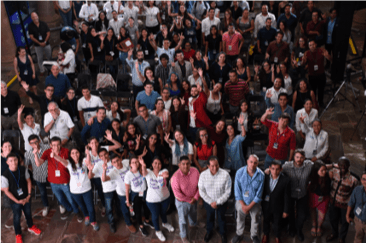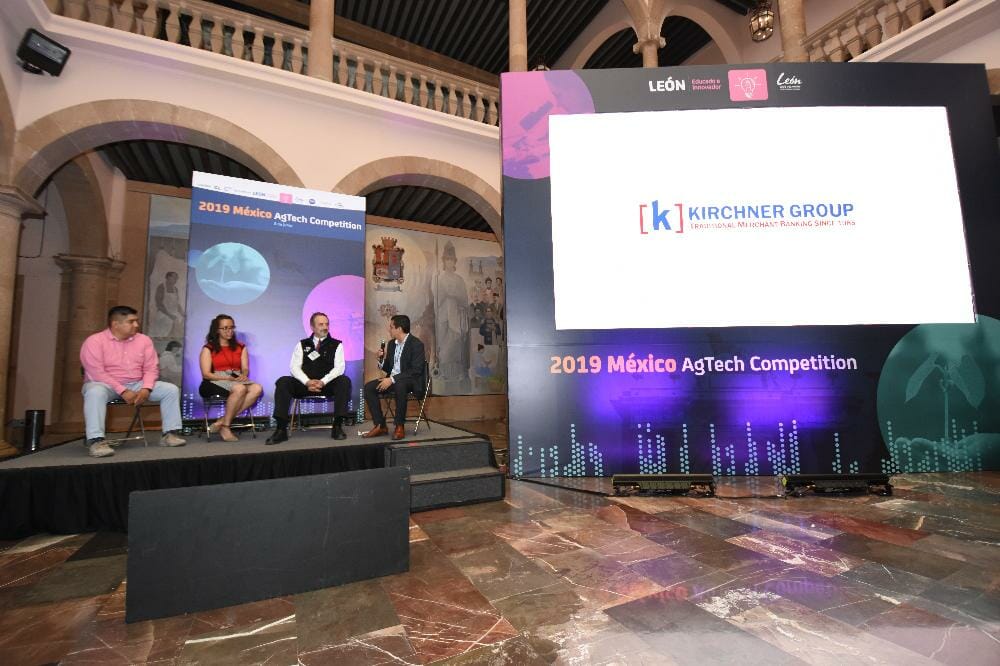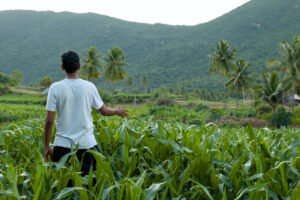Editor’s Note: Adrian Garcia-Casarrubias is director of the Kirchner Food Fellowship Mexico, a student-led impact investment program operated by the Kirchner Impact Foundation, one of the ‘returning’ arms of Kirchner Group the North American traditional merchant bank. A few months ago the Foundation announced a partnership with the local government of Leon and the state government of Guanajuato in Mexico to launch the fellowship program in the region.
Agriculture and Mexico in the same sentence is no surprise – the sector generates around $49 billion every year with the main exports being avocados, tomatoes, and berries. In general, Mexico is considered in the top 10 of food producing and exporting countries, yet what I witnessed during the recent “2019 Mexico AgTech Competition presented by Kirchner Group & Thought For Food” was inspirational and motivating.
The event was held in the beautiful and historic City Hall of León, after historic single day rains flooded our original venue at the iconic IMAX theater at Explora science museum just two days prior to the event (that is a whole other story!)
 After establishing our partnership with the Innovation Direction of the Municipality of León, Guanajuato and the Knowledge Economy Promotion Direction of the Ministry of Innovation, Science and Higher Education of the State of Guanajuato, we put out a national call for innovative AgTech companies (pre and post-revenue) to apply to pitch their companies during the inaugural event.
After establishing our partnership with the Innovation Direction of the Municipality of León, Guanajuato and the Knowledge Economy Promotion Direction of the Ministry of Innovation, Science and Higher Education of the State of Guanajuato, we put out a national call for innovative AgTech companies (pre and post-revenue) to apply to pitch their companies during the inaugural event.
It was a painstakingly difficult selection process done by an international panel to select the top 12 companies from a group of 50+ applications. Those top 12 each gave a 3-minute pitch during the event to a judging panel comprised of the 2018-2019 Kirchner Food Fellows.
Guanajuato is recognized for its economic development and importance in the food and agricultural industries in North America. The State’s entrepreneurship ecosystem is robust with 478 entrepreneurs, centers designed to help train more than 19,000 entrepreneurs in the region. It has also developed specialized academic programs designed to meet the needs of industries and has optimized its science-technology infrastructure, creating innovation and business clusters.
Overall in Central Mexico the entrepreneurship ecosystem has been evolving in an organic but accelerated fashion. To enhance early stage projects and R&D, Mexico has created a robust network of public and private universities that have developed their own business incubators often with public funding support for their research via government grants. The country is also home to world class business incubators like StartUp Mexico and Wayra, accelerators like NXTP Labs and Social Labs and access to angel investment sources like Angel Ventures and the Angel Investment Network.
Specifically related to AgTech, some pioneers in the region include Agrobioteg Innovation Park in Irapuato, Guanajuato, a business incubator, accelerator and lab co-working space devoted to the sector, and FIRA, a Trust Fund Instituted by the Mexico Central Bank for agriculture and food industry development, that gives loans to ag-entrepreneurs at premium rates allowing them to further develop their ideas.
 Over the last 10 years, venture capital and private equity in the country has grown over 15% reaching over $53B USD in capital commitments across various sectors and asset classes according to AMEXCAP (Mexican Venture Capital and Private Equity Association). However local early-stage funds investing in AgTech and agriculture, in general, have only more recently started to be established thanks to groups like FOCIR (Fondo de Capitalización e Inversión del Sector Rural). This specialized branch of the Federal Government was created to promote investment in the rural and agroindustrial sector of the country – they manage a number of later stage PE funds as well as sponsor new and existing venture funds. In 2017 they announced the funding of three local agtech funds that were seeking to bridge the gap of access to early-stage capital in the industry.
Over the last 10 years, venture capital and private equity in the country has grown over 15% reaching over $53B USD in capital commitments across various sectors and asset classes according to AMEXCAP (Mexican Venture Capital and Private Equity Association). However local early-stage funds investing in AgTech and agriculture, in general, have only more recently started to be established thanks to groups like FOCIR (Fondo de Capitalización e Inversión del Sector Rural). This specialized branch of the Federal Government was created to promote investment in the rural and agroindustrial sector of the country – they manage a number of later stage PE funds as well as sponsor new and existing venture funds. In 2017 they announced the funding of three local agtech funds that were seeking to bridge the gap of access to early-stage capital in the industry.
Despite this clearly blossoming environment for entrepreneurs, I must say candidly that the quantity and quality of the pitching companies surpassed my every expectation ranging in focus from biotech to vertical farming to alternative proteins, to molecular diagnostics and everything in between. The winners of the Grand Prize, a $5k award from the Kirchner Impact Foundation, as well as advisory services from Kirchner Group, was Griyum, a company that has developed a new technology that improves farming and processing methods of crickets as a high protein source for livestock and human nutrition.
The second prize went to Plant Care Biotech, a project from the CINVESTAV Irapuato Research Center that uses plant aromas (organic volatile compounds) to protect plants against pathogens and promote their growth.
The event was also co-presented by the Thought for Food Foundation, making it the first of their new series of TFF Regional Events. Kirchner Impact Foundation portfolio company Grupo Solena, an innovative biotech company from Leon in Mexico that restores the balance in a farmer’s soil by harnessing the soil’s native biological capital (microorganisms), also sponsored the event.
I am confident in saying that the AgTech sector in Central Mexico is flourishing and it should no longer be a surprise to anyone thanks to the robust governmental initiatives, an evolving local ecosystem, and international events like this one that brings companies on the leading edge of innovation to present their business plans to a diverse audience of fellow entrepreneurs, potential partners, and investors. We can´t wait to see the amazing companies and projects next year.





